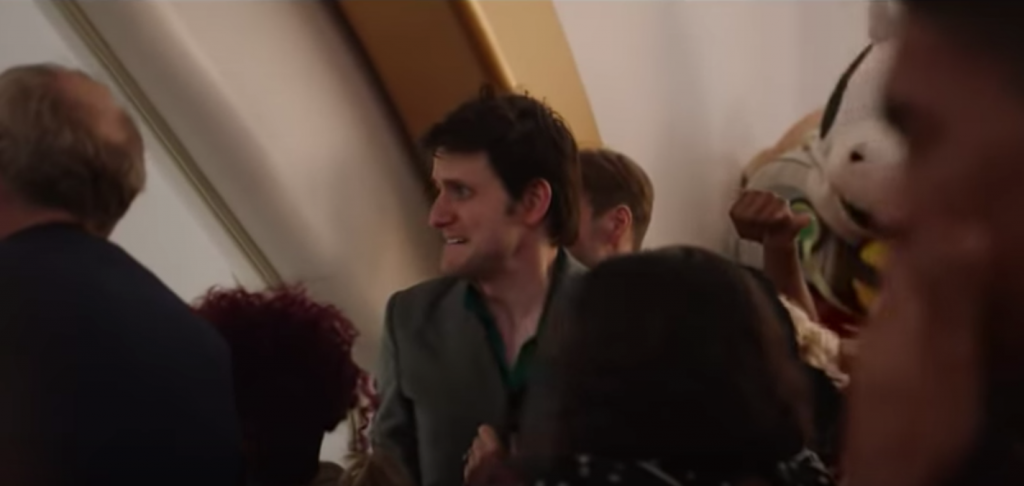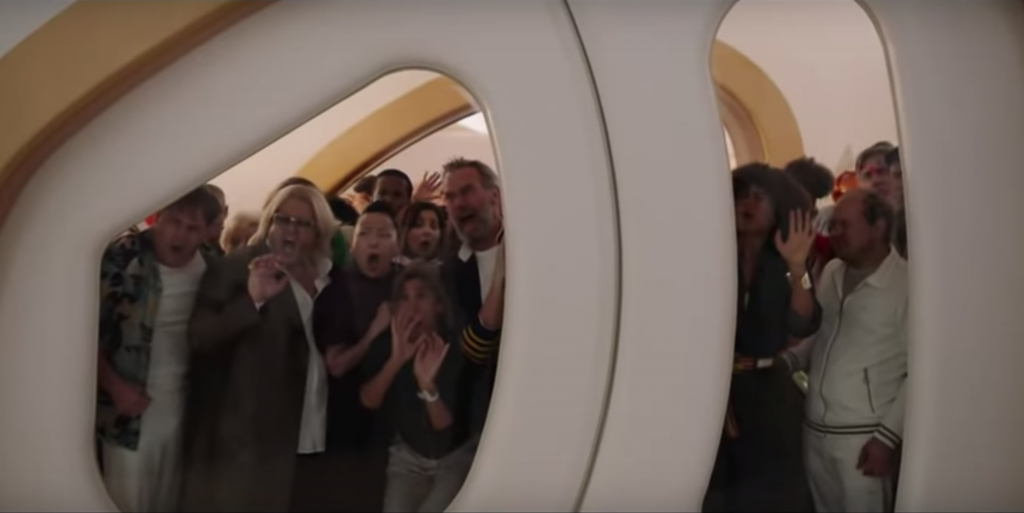Airlocking
What is Airlocking?
Airlocking is a process where a belief spreads and locks-in to the point that direct, disconfirming, evidence is disregarded, and people believe something to the point that they’ll kill themselves by throwing themselves out of an airlock.
If there is another term for this phenomenon, could you please let me know?
In the meantime, I’ll call it Airlocking.
Etymology
Consider the following scene from Avenue 5, Season 1, Episode 8. It aired just as those in the United States and Canada were understanding the full gravity of Covid-19 in March, 2020. TV is useful because it gives everybody the opportunity to experience the same phenomenon for themselves, independently. Everybody has a different reflection. The whole episode is great. Check out the clip below while it’s still up.
Spoilers.
The setup is that there’s a belief that the whole ship is a show. After all, the captain’s hair isn’t real and he often breaks into a British accent. The deck crew are actors. Somebody pulls the letter E off a sign and declares that it’s just a set (Judd insists that it’s real, just cheap.) A few moments before the clip begins, Matt Spencer, the head of customer relations and a nihilist, gives out the code for the airlock (5335) because he likely believes nobody would be so silly as to jump out of an airlock. (Go ahead!)
The clip opens with a man shouting that Daddy’s Coming. Somebody taps the password in, the airlock door opens, and the father jumps in. The outer door opens.
He is instantly frozen by the void of space.

Matt Spencer experiences horror and guilt.
A woman wearing a pink Miami shirt insists that it isn’t real. That it’s VFX. Visual Effects. And not even good ones. She repeats the belief that this is all just a show, and that the man that had just been frozen to death in a vacuum was on his way to the green room right now.

The captain, Ryan Clark, challenges the belief, restating the objective fact that they had all just watched a man become desiccated.

The woman in the pink Miami shirt insists that he’s fine. This gives way to a conflict between a separating(?) couple, and, an ongoing conflict between Harrison and Judd. Judd admits that he has no idea what is going on. Harrison rejects that.

Harrison storms towards the airlock and confronts Captain Ryan Clark. The captain, unwilling to strike Harrison, asks Billy to hit him. Billy debates hitting him with an E.

Harrison yells that she’s got an E, and that he will pay anybody a thousand new bucks to help him escape. Use the code! 5335!

And of course they do! Harrison and the Mother (Daddy’s Coming!) jump into the airlock. They are frozen instantly. The captain turns around and asks:

“Okay! Does anybody else think that it’s a game show?”

Sarah, a hand model and an actor on the bridge, and three other people do. And they charge the airlock. They get in. The door closes.
They’re instantly frozen.

The crowd reacts in horror as Sarah’s hand is shattered into a dozen pieces.
Belief, Contagion and Comedy
A few observations.
The seven people who threw themselves out of an airlock were all witnesses to evidence that they were on a show. Captain Ryan really has a British accent, he does wear a wig, the bridge crew are all actors, the E does come off a wall. Even during the chaos of rushing the airlock, the E is waved around in their faces. As the lady in the pink Miami shirt declared, “The Fourth Wall Crumbles!”
In the context of absolute ground truth – she’s right. Avenue 5 is a show. They are on Earth. It is VFX. Everybody is an actor. Those people did go to the green room after the scene. The E is a cheap prop. The most outer part of the onion is the skin – it is dry, true, and factual. And it’s absurd.
Within the context of the show, Pink Miami is a catalyst of the belief. She applies her expertise to what she wants to believe. And she is persuasive. And that persuasion is contagious. That’s evident because people die at a geometric rate. 1, 2, 4.
Evidence from the first person freezing and then floating out of the airlock is discarded by the next two. Evidence from two people freezing is in turn disregarded by the next four. What they see is sometimes challenged by what they hear. While they do hear the screams and the horror, they also hear counter-arguments. They also come with their own pre-existing beliefs.
This is especially true of Harrison. Harrison is Judd’s rival. They are in near constant, over the top, conflict in the episodes leading to this. The airlock scene is the peak of their conflict. Harrison has pre-existing belief that Judd is an imposter. He even says so: “I should have known a trip to Saturn was beyond you, you small time huckster.” Harrison is locked into this belief. When Judd says that he thinks they are in space, “probably”, Harrison rejects this. To Harrison, Judd is lying because it contradicts what Harrison believes to be true.
Great comedy comes from relatable characters with obvious character flaws struggling to achieve some goal. In general, the deeper the flaw, and the more improbable the goal, the more likely it is to be funny.
In this instance, we have various people trying to achieve goals. The Father and Mother want to get home to see their son who has awoken from a coma. (Multiple characters judge them – who goes on a six month Spa cruise to Saturn while their son is in a coma? It’s pretty funny.) Harrison wants to get home and humiliate his rival. Sarah wants to do a good job.
The Father disregards initial evidence. The Mother disregards the captain and believes Miami Pink over her own eyes. Harrison is blinded by jealousy and malice. Captain Ryan Clark delegates authority at exactly the wrong time (as he often does). Sarah confuses her character with the character she plays. Their flaws prevent them from being able to update their beliefs. They’re locked in.
Their flaws are numerous and end up killing them.
They airlock themselves to death.
Reflection
In episode 9, Judd remarks “You can lead a horse to water, but you an’t stop it from throwing itself violently out of an airlock.” To which Captain Ryan disagrees. You can harness a horse.
But can you?
This matters.
The scene was especially impactful given the conspiracy theories going around about Covid-19 the evening of March 12, 2020. Many people believed that it wasn’t a threat, and were locked-in that belief. Many, at time of writing, are still convinced that it’s a big hoax, and are still figuratively airlocking themselves (and each other).
A repeated theme of Avenue 5 is how a false belief is formed, goes unquestioned, and spreads. It’s as though the character flaw of a group is common to so many. It’s the gullibility or the default to trust. So many of our social systems, and the basis of our collective security and wealth, depend on this default to trust. Even if this enables group behaviour to reinforce on themselves to the point of airlocking.
What if the wisdom of the crowd isn’t all that wise?
Captain Ryan Clark could have used violence to harness the horse in an effort to stop it. But would that tactic have succeeded? By delegating to Billy, did he end up saving dozens of people instead of losing seven?
This is just a television show. So what?
I offer:
It gives you the opportunity to safely watch contagion from a distance. You’re watching social contagion from a perspective that you might be able to see social contagion very clearly. You’re able to watch and feel something that people who study social contagion are able to describe mathematically. You’re able to safely experience the distinctions from a distance because you are not part of the mob.
Maybe we should be careful with the beliefs we seed in networks, because we’re never certain which ones will get picked up and take on a life of their own?
I’m with Judd on this. I’m not so sure you can harness a horse.
If there is another term for this phenomenon, could you please let me know?
In the meantime, I’ll call it Airlocking.
